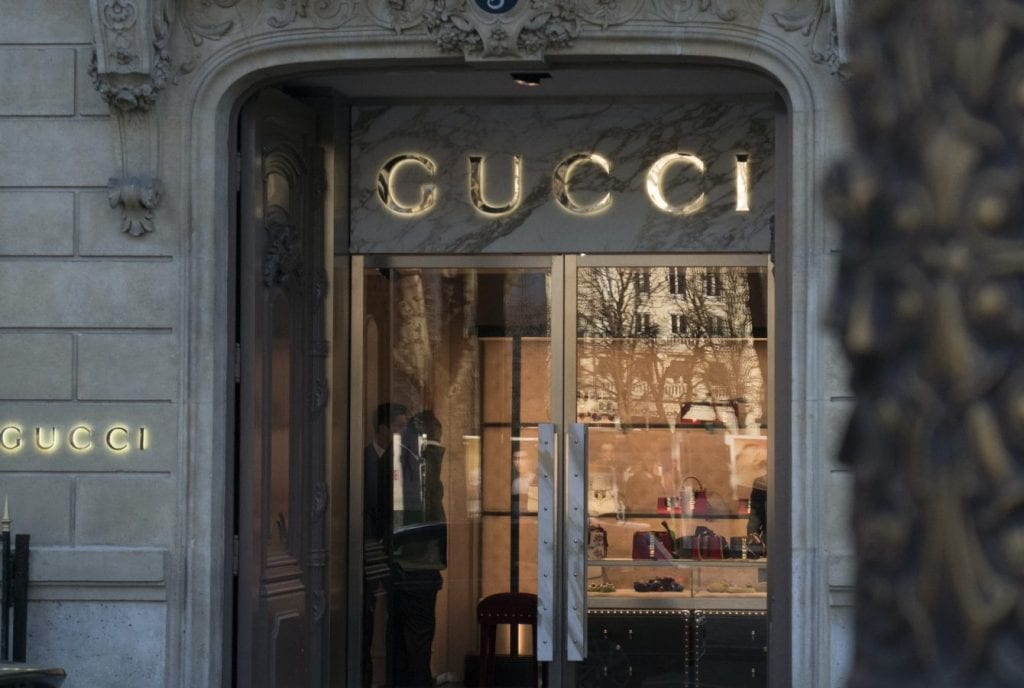The docket in the case that Susan Giordano, Angelene Hayes, and Ying-Liang Wang filed against Saks Fifth Avenue, Louis Vuitton, Loro Piana, Gucci, Prada, and Brunello Cucinelli has been relatively quiet on a substantive front since it got its start in February. However, on Monday, counsel for Gucci America submitted a letter to the court on behalf of all of the defendants that provides a look into what is to come in the case that accuses the big-name fashion entities of entering into “unlawful No-Hire Agreements” to control the wages and certain job conditions of luxury retail employees.
In the November 9 letter, Gucci’s attorney Corey Roush of Akin Gump asks the court for an order staying discovery in the case, which was filed in February in a federal court in Brooklyn, New York, pending resolution of the motion to dismiss that the defendants – namely, Saks, Louis Vuitton, Loro Piana, Gucci, Prada, and Brunello Cucinelli – will “fully brief and submit to the Court by year-end,” particularly given the that the plaintiffs “have served a total of 234 requests (39 per defendant with multiple sub-requests) seeking detailed compensation data for hundreds of thousands of employees and other information spanning six retailers on a nationwide basis dating back to 2012.”
“A stay of discovery is appropriate in these circumstances,” Roushasserts, especially since the “plaintiffs, who waited more than four years to bring their complaint, will suffer no prejudice from a stay, and [the] defendants’ motion to dismiss will be fully briefed in less than sixty days.”
Shedding light on some of the claims that the defendants will likely make in their impending motion to dismiss, Roush states that Giordano, Hayes, and Wang assert a single claim under Section 1 of the Sherman Act based on “an alleged conspiracy” carried out by the defendants. In furtherance of that conspiracy, the plaintiffs – who were previously employed as Luxury Retail Employees at Saks – claim that the defendant brands followed “a protocol” with one another not to hire Saks employees without consent from Saks or until a six month period had elapsed from the end of their Saks employment.
According to the plaintiffs, the alleged “no poach” restrictions that are placed on Saks employees are not made clear to employees at the outset of their employment, and the mandated six month “rest” period between jobs is not compensated in the same way that an employee would be paid during the duration of a non-compete period, for example. As a result, they argued that the practice has “restricted trade and [is] per se unlawful under federal law,” as such behavior places “illegal horizontal restraints on competition.”
“Because the defendants control a significant number and proportion of the luxury retail jobs in the United States, their no-hire agreements have reduced competition for Luxury Retail Employees,” the plaintiffs claim, and have “prevent[ed] the plaintiffs and members of the proposed class from obtaining employment and earning compensation in a competitive market, reducing compensation, and preventing or limiting employment opportunities and choice with respect to such opportunities.”
The problem with such allegations, according to Gucci’s counsel? Giordano, Hayes, and Wang have made “no factual allegation of any ‘overarching agreement’ among all [of the] defendants, that one existed between or among any [of the] brand defendants, or that any employee of [the] brand defendants was subject to this restraint.” Instead, they “rely solely on their personal accounts at only three Saks stores (among dozens) from more than four years ago” to make their case, while also failing to “plead any market share or market power allegations of any [of the] defendants.”
Speaking to the impending motion to dismiss, Roush claims that not only are the plaintiffs’ claims barred by a four-year statute of limitations, which accrues when the plaintiff first suffers an antitrust injury, they fail to set out “a plausible” Sherman Act Section 1 claim, which requires them to establish that there “(1) an agreement and (2) the relevant market where that agreement had anticompetitive effects.”
Instead of alleging plausible facts, they “merely assert naked conclusions that the] defendants engaged in an ‘overarching conspiracy’ to restrain competition in a nationwide labor market for “Luxury Retail Employee[s],” per Roush, who claims that they “provide no factual allegations that (1) there is any such ‘agreement’ among the defendants, relying instead on vague references to individual ‘policies’ or ‘protocols;’ (2) [the] defendants offer employment opportunities that are not ‘interchangeable’ with those offered by other non-defendant luxury or other retailers; (3) there is national – as opposed to strictly local – competition for luxury retail employment; or (4) the defendants have market power in any properly defined market.”
On the contrary, the plaintiffs allege that “each [of the] defendant brands entered into a bilateral agreement with Saks, a retailer that sells some of the defendants brands’ apparel, and acknowledge that the defendants compete with ‘other department stores, concessions, and standalone boutiques.’”
With the foregoing in mind and “given the nature of the case, requiring [the] defendants to engage in discovery that [the] plaintiffs themselves admit is ‘extensive’ before [the] defendants’ motion to dismiss is decided is disproportionate to the legitimate needs of the case and unduly burdensome.” As such, Roush has asked the court to stay the defendants’ discovery obligations until they have submitted their motion to dismiss and it is decided by the court.
Since the case was first filed in February 2020, LVMH-owned Fendi has been voluntarily dismissed from the case, having been named as a defendant in the plaintiffs’ initial complaint but not in the amended one that they filed with the court in May.
*The case is Giordano et al v. Saks Incorporated et al, 1:20-cv-00833 (EDNY).














